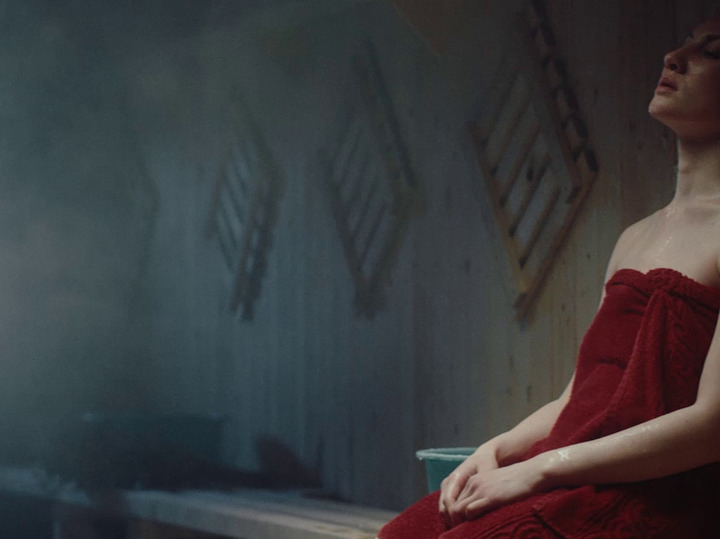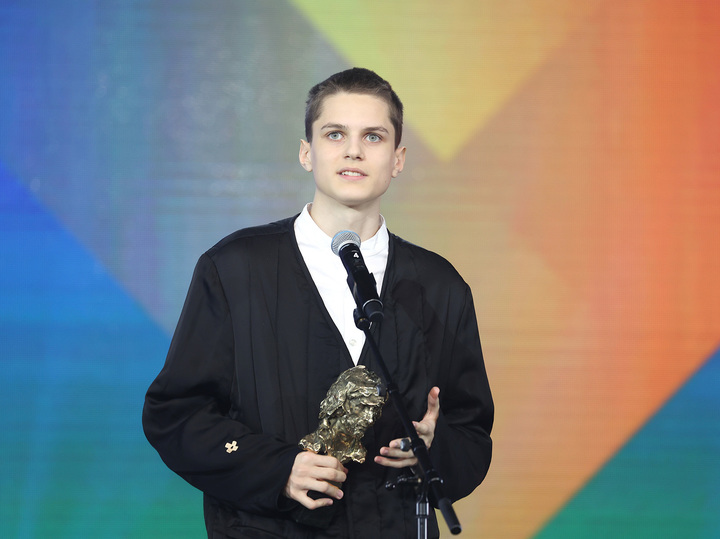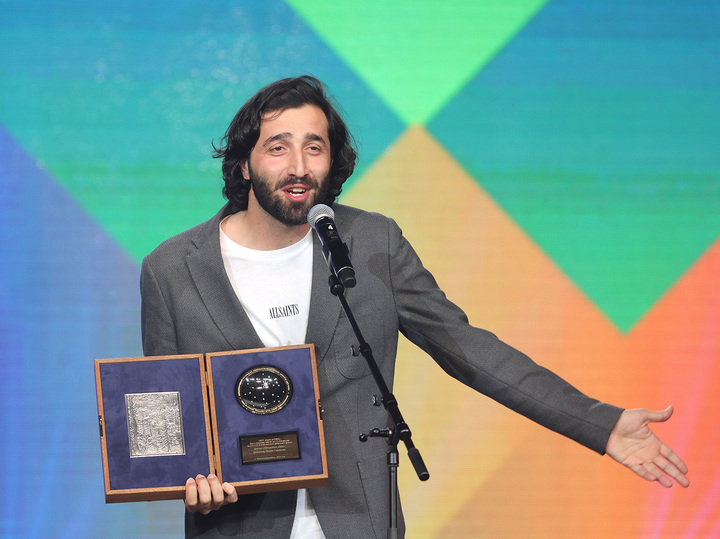All the “taiga gold” in Siberia went to an Abkhaz film about the theft of nuts
[ad_1]
“The Last Price” received the main prize “Golden Taiga” as the best domestic debut film. It would seem that this is quite enough for the highest rating of the picture. However, the jury, led by director Alexander Veledinsky, which included composer Maxim Dunaevsky, director Angelina Nikonova, actors Svetlana Ivanova and Maxim Stoyanov, cameraman Eduard Moshkovich, did not stop there and also awarded the “Silver Rose” for the best work with music. The regulations of many festivals state that a film that has received the main award cannot qualify for additional prizes. He is the best and is the best in every sense.
But here a note of redundancy was added by the prize of the Guild of Cinematographers named after. Pavel Lebeshev “For the best camera work” – to Dmitry Znamenshchikov, and “Flowers of Taiga Hope”, awarded based on the result of audience voting. Judging by this recognition, we can assume that we are talking about some outstanding painting.

“The Last Price” is a completely traditional movie without any innovations, notable for the fact that it was filmed in Abkhazia, where the director himself is from. After school, he worked as a cameraman for local television. In 2016, he graduated from the St. Petersburg University of Film and Television, where he studied in the workshop of Sergei Snezhkin, and directed two short films. And then – a long silence. Only eight years later, Naur was able to present his full-length film, shot at Lenfilm. A sad evidence of waste, and not the only one. Young directors look for funding for years, and when they don’t find it, they leave cinema without ever starting their career.
Naum Garmelia told a story about the life of a Russian family in a poor Abkhaz village in the 2000s. It is based on real events. It is about people whom the director knew personally. Here everyone talks only about nuts, which have become the only source of income for the village residents. They are sold and stolen. They are traded for and killed. A cunning local old man will teach a Russian family how to sell their goods as profitably as possible. Nuts should be soaked in sunflower oil. They will gain weight. And the presentation will be much better. It doesn’t matter that the nuts will turn black later.
The Russian promised to sell the nuts to one buyer, but then he would find a more profitable option. It would seem nonsense, but the locals do not forgive this. This is on the one hand. On the other hand, there is mutual responsibility; a whole performance is put on to deceive gullible strangers. As a result, a tragedy of ancient proportions will occur, a young guy will die. Blood feud will lead to brutal reprisals. The story is terrible and hopeless. After the shooting of spectators in Crocus, the shooting on the screen plunged the audience into a state of horror. The film was shown a couple of days after the terrorist attack. Perhaps this circumstance played a decisive role in the emotional assessment of the jury and spectators.
Two acting awards. Alexander Abdulov, who was at the origins of “The Spirit of Fire”, was awarded to young Mikhail Ivanov, who played the main role in “Lapin” by Asya Poleshkevich and Vlad Krasnoslobodtsev – directors from St. Petersburg, students of Konstantin Lopushansky, and Irina Salikova for the role of a nurse in Dmitry’s “Contacts” Moiseeva.
The talented debutant Mikhail Ivanov was found by his mother, the casting director of Lapina. Her son is unusually handsome, even too handsome, with transparent eyes, like the ichthyander Vladimir Korenev in the Soviet film “Amphibian Man,” also filmed at Lenfilm in 1961. We haven’t seen such faces in our cinema for a long time.

Mikhail played a high school student who finds himself in a provincial town, in his mother’s homeland, after his parents’ divorce. Previously, the family lived in Moscow, but the father left for Canada, leaving his wife and son without housing in the capital. Why this happened and what kind of person he is is unclear. The story is vague, and no one began to understand it. Lapin is having a hard time at his new school. He avoids his classmates and dreams of going to his father as soon as possible, but he will have to accept his fate.
The role of a classmate who shows interest in him was played by the talented Taisya Kalinina, who was remembered in “One Little Night Secret” and “Alice’s Dream” by Natalya Meshchaninova. Young directors could not offer her anything new; they used what had already been developed before them. Although they managed to assemble a serious cast. Lapin’s mother was played by the beautiful Nadezhda Lumpova, and the physical teacher, whose sports career suddenly ended, was played by Ivan Dobronravov. Now he is preparing a newcomer for competitions, and it is as if he is returning to real life, where prospects are highlighted. “Lapin,” like “The Last Price,” is a very strong audience movie, which the jury preferred to all other searches, sometimes for something unknown.
The second laureate, Irina Salikova, played in “Contacts” a nurse who alone is capable of compassion for the alien Vitalik, who unexpectedly appeared in a provincial town. A local pensioner mistook him for her son, who fulfilled his international duty in Afghanistan and disappeared into the abyss there.
“Contacts” refers to the Soviet films of Pavel Klushantsev, named by George Lucas as the godfather of “Star Wars”, to Alexei Balabanov’s idea about the alien Alyoshenka, who is found by an old woman, as well as to “The Shape of Water” by Guillermo del Toro, which, in turn, was inspired Soviet film “Amphibian Man”. The circle is closed. Perhaps the aspiring director knew nothing about his predecessors. He relied on the real story of the Kyshtym dwarf, whose mummified remains were found in the Chelyabinsk region and gave rise to the most incredible speculation.

Emir Kusturica presented his presidential prize “Golden Taiga” to Konstantin Bogoslavsky for the unusual, experimental film “Cuba, Marina” (Russia-Israel). The illusion is created that this is a documentary film, although it cannot be classified as a mockumentary. The heroes are working at a construction site – a port is being built. We observe the lives of workers, hear the most ordinary conversations about everyday things. A typical Russian woman tells her colleagues that she has hardly been anywhere and has lived all her life in her town. We simply watch the flow of life, listen to industrial sounds. And if at first everything seems so insignificant and uninteresting, then from these scraps of conversations and intonations, faded city landscapes, a symphony of life takes shape, in which inexplicable events occur. Someone disappears, someone finds their love, tries to analyze their destiny based on someone else’s experience. Professional actors do not always get along with non-professional ones. The presence of Leonid Bichevin seems very strange. He “deals” the director and his plan, unless, of course, there was some hidden meaning invested in his appearance on the screen, which we could not calculate.
It’s a pity that the jury ignored “Lisbon” by Svetlana Filippova, who came to feature films from animation, where she achieved a lot. This is another story of a broken family and the impossibility of contacts at different levels. The film contains simply masterpiece scenes with the participation of Maria Smolnikova and her husband and actor Ivan Orlov as they walk through the city. Cameraman Andrei Naydenov amazingly captured the earthly and unearthly world at the same time, although he partially overwhelmed the picture with the beauty of visual images.
“12 Floors Later” by Krasnoyarsk director Jeff Agayev, an adult who unexpectedly turned out to be a student of Yevgeny Tkachuk, starring in his crazy film about other people’s dreams, is perhaps the most unpredictable thing I’ve seen. The hero – the same Jeff – comes into contact with Pushkin, Evgeniy Tkachuk, Oleg Garkusha, and himself. Absurdity squared? For sure. But another such opportunity may never arise again. That’s why the debut was given, to make plenty of noise.
The competition program seemed controversial to some, but you definitely can’t deny it variety and surprise. The main thing is that it presented not an average something, but a crazy, free cinema, which you expect from debutants every time.
[ad_2]
Source link






